Lots of Strange Bedfellows Toward a Plausible Translation for Purim
Couldn't load pickup availability
The traditional etymology of "Purim" as derived from the Hebrew word for "lot" obscures a more compelling linguistic and thematic interpretation centered on beds, alliances, and survival. Philological analysis reveals that the Aramaic word "purya," referring to both beds and the festival of Purim in rabbinic literature, shares deep connections with the biblical "apiryon" (palanquin/bed) and Sanskrit cognates. Through comparative lexicography and examination of rabbinic texts, significant narrative parallels emerge between talmudic accounts featuring "purya" as bed and central themes in the Book of Esther—particularly how Esther's marital bed becomes an instrument of Jewish survival through her relationship with King Ahasuerus. The etymological link between Purim and beds serves crucial narratological functions, illuminating the morally ambiguous alliances Jews have historically formed for survival. Rather than deriving from "lots," the festival name "Purim" likely stems from "bed," embodying the "strange bedfellows" theme fundamental to the Esther narrative. This reinterpretation frames Purim not as a holiday celebrating chance or divine providence, but as a commemoration of necessary yet morally complex survival strategies that have characterized Jewish history.

More Information
-
Physical Description
-
Publication Information
Published 2013
ISBN
-
Publication Credits

